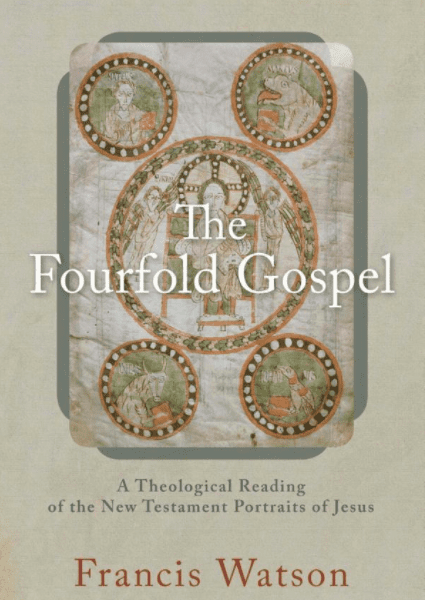 That Matthew’s Gospel begins with a genealogy strikes the contemporary reader as strange. It is at least for most a listing of names largely unknown or at least barely known. But the early church found insight into the Gospel of Matthew because of its beginning.
That Matthew’s Gospel begins with a genealogy strikes the contemporary reader as strange. It is at least for most a listing of names largely unknown or at least barely known. But the early church found insight into the Gospel of Matthew because of its beginning.
Both Ezekiel and Revelation record a vision of the throne with four beasts around it and in each beast the early church found one of the Evangelists, and each found something to say about how its beast corresponded with its Gospel. Here is Francis Watson, The Fourfold Gospel:
In both cases, the throne is accompanied or surrounded by four living beings, each with four different faces according to the prophet, each with one of the four different faces according to the seer.
For early readers of the canonical gospels, these scriptural images match their own experience of four very different texts that together bear witness to the one Christ. This correspondence between the different faces of heavenly creatures and earthly texts is most clearly visible in the gospels’ different starting points. There is a human face, and it corresponds to Matthew’s opening genealogy of the Jewish Jesus, descended from David and from Abraham. The lion’s face evokes the roar from the desert with which Mark introduces the wild figure of John the Baptist. The face of a calf speaks of sacrifice and the temple, which is where Luke’s narrative both begins and ends. The eagle that soars into the heights is the evangelist John, whose gospel opens by bearing witness to the eternal Word who was with God in the beginning and who was God.
When he turns to Matthew Watson explores the genealogy as the face of Matthew’s Gospel. His summary of Matthew:
Matthew’s gospel bears witness to a Jewish Jesus whose person and work are shaped by his people’s history as interpreted in the scriptural record. This gospel was placed first in the canonical collection because its early readers were convinced by its fundamental claim: salvation has come to the world in the person of a Jew.
That summary to his chp does not capture the fullness of the chapter itself. To begin with, Watson admits that while most early Christians saw the canonical order as the chronological order, Papias of Hierapolis did not. Origen and John Chrysostom represent the tradition: first Matthew.
What to me is a bit odd about this chp is that Watson not only explores the importance of the genealogy for Matthew but seems to buy into the idea that the genealogy is the hermeneutical key. Well, the whole Gospel is the hermeneutical key even if the genealogy sets out important themes. Or at least some of them.
Matthew defends the historicity of Jesus as a Jew as fundamental to salvation, which means Israel’s story is given prime place in the Gospel as its foundation. No one can deny Jesus’ Jewishness and therefore the Jewishness of the Christian gospel itself.
Critical to Watson, and for me the best idea in the chp, is the “double genesis” of Jesus. Jesus is both a son of Abraham and David as well as the son of God and Mary. A double genesis (Matthew 1:1 and 1:18). How then is Jesus the son of Joseph, when he is not born of Joseph? That’s a question that pesters Watson a bit, and leads to his belief that Jeconiah is counted twice — I don’t know why he doesn’t count both Jacob (father of Joseph) and Mary.
The narratival elements of the genealogy are explored in both accessible prose and penetrating insights. E.g., is the “Joseph son of Jacob” focused on Judah son of Jacob because the Joseph son of Jacob is used later? Why does Matthew have so many unedifying stories in his genealogy? Part of this question is rooted in some harsher readings of the women in the genealogy than might be necessary. If Watson thinks Matthew marginalizes Joseph I would say Watson marginalizes Mary: the women of the genealogy are connected to Mary. She deserves more attention.
The narrative’s shadow side of sin sets up the need for redemption in two ways: both Jesus is Messianic Savior and the story of Israel can’t redeem itself. It needs a Savior. This is well done.











